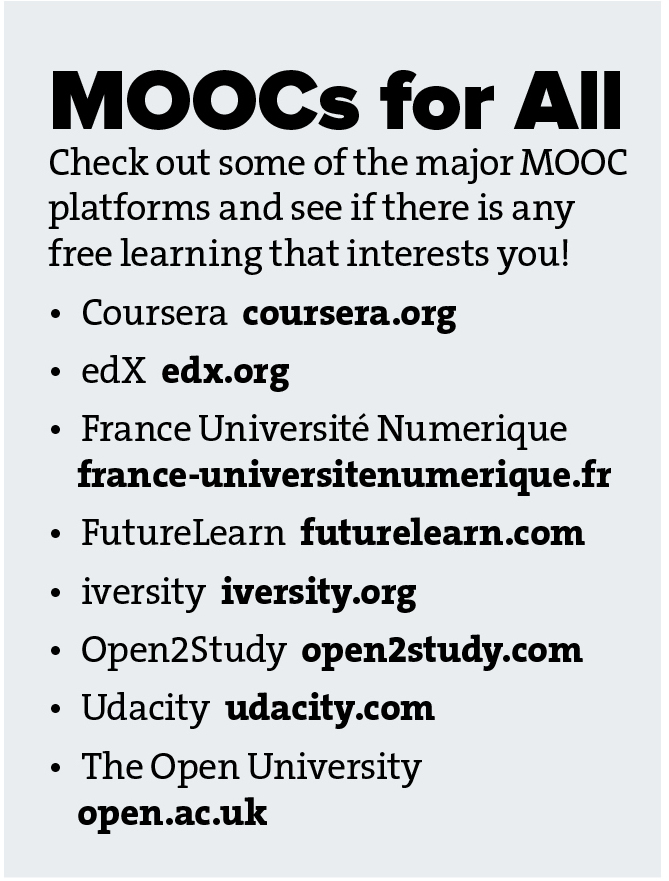Right now, you – yes, you reading this magazine – have access to thousands of absolutely free, open, online courses covering hundreds of topics taught by the world’s leading experts and teachers. Welcome to the information revolution! Advancements in technology and knowledge sharing have transformed all areas of learning and education. Join the movement that utilizes digital platforms to enable widespread access to information: Massive Open Online Courses – also known as “MOOCs.”
Right now, you – yes, you reading this magazine – have access to thousands of absolutely free, open, online courses covering hundreds of topics taught by the world’s leading experts and teachers. Welcome to the information revolution! Advancements in technology and knowledge sharing have transformed all areas of learning and education. Join the movement that utilizes digital platforms to enable widespread access to information: Massive Open Online Courses – also known as “MOOCs.”
MOOCs are courses offered on the Internet with unlimited enrolment and are accessible by anyone with an Internet connection. They generally feature content, instruction and assessments that are open and available to all.
Millions of people are taking advantage of the opportunity. According to Class Central, an online MOOC portal that monitors and reports on the global MOOC movement, more people signed up for MOOCs in 2015 than in the previous three years. This brings their calculated total number of MOOC students to 35 million, increased from 16-18 million in 2014. MOOCs are taking over.
Currently, MOOCs have three basic ways of engaging students. First, they provide information via videos of lectures or readings, often from experts in the field. Second, they include additional interactive elements, such as peer grading, study groups (both in-person and online), discussions among students as well as between students and instructors.
Finally, the coded infrastructure allows students to share insights from their projects in a “knowledge base” that grows within the course and after completion. This is the community-building element of MOOCs, and has helped drive MOOC’s popularity. Today, there are many exciting varieties of MOOCs developed, such as student-driven and cross-university collaborations.
Knowledge can no longer be contained in a silo.”
In 2008, the term “MOOC” was coined by University of Prince Edward Island’s Dave Cormier in response to a course called Connectivism and Connective Knowledge, and refers to online courses. Today, most top universities including the likes of Stanford University, Massachusetts Institute of Technology (MIT) and Harvard University, have created some form of MOOC and have attracted enrolment numbers in the hundreds of thousands.
EdX, for example, is a non-profit, open-sourced MOOC provider developed by MIT and Harvard in 2012. The website boasts education partners from 90 countries and students from every country in the world taking courses on subjects ranging from engineering, computer science, philosophy, architecture and everything in between.
By providing expanded online content that covers the required foundational knowledge, instructors have new opportunities to revolutionize the classroom into more experiential, interactive environments. The New York Times’ 2012 “Year of the MOOC” piece gives an example. In fall 2011, the University of Stanford offered a MOOC on Artificial Intelligence. 160,000 students in 190 countries registered. 200 Stanford students attended the course in-person, but by the end of the year only 30 students were going to class. This was because most students actually preferred the online version. Online, students took ownership of the course by setting up a Facebook group, discussions and voluntarily translating the course material into 44 languages.

In today’s digital world, the growing pressure to provide information in a free and open way will encourage the development of education structures, like edX, with fewer inequities. Knowledge can no longer be contained in a silo.
We are all participating in profound changes to the way information is created and consumed. This includes deep disruption to structures of how information is acquired, created, shared, manipulated and managed as we know it.
Because of this, the ability to share and mobilize knowledge is critical for everyone, including the environmental movement. The MOOC format can:
• Provide information globally
• Address inequalities in information access
• Revolutionize institutional learning
• Diversify perspectives and connect disparate viewpoints
• Drive social change.
Perhaps most exciting of all, MOOCs could help the sustainability movement.
What are GhGs? What is climate change? What are the top three actions an individual can take to contribute to collective environmental change?
The ability to share and mobilize knowledge is critical for everyone, including the environmental movement.”
New people are joining the sustainability movement every day and want to know the answers to these questions. Besides unprecedented diffusion of information, MOOCs have an untapped potential for creating social change. Environmental organizations could design MOOCs that offer an introduction to the basics of sustainability for newcomers, as well as access to a community of like-minded, active people. When information is personally relatable, people are more motivated to act on it.
Sustainability experts and community activators could work together to improve the collective movement’s network of knowledge, using MOOCs as the vehicle. This would make the process of learning about sustainability as straightforward as possible, improving the efficiency of the movement as a whole.
The Waterloo Region Environmental Network (WREN) is dedicated to collecting and disseminating the cumulative knowledge of the area’s environmentally oriented groups. Through the Network’s efforts, Waterloo Region has experienced the effects of organizing and sharing the knowledge and resources in the local environmental scene. Since WREN was first proposed in 2014, their collective effort has connected 112 organizations, recruited 680 volunteers and raised 30,000 dollars. MOOCs could help create outcomes like these on a global scale.
The MOOC movement is hitting critical mass, and is already provoking disruption to the status quo. With our collective effort, MOOCs could be fundamental to achieving significant, rapid environmental change. If we do, the environmental community stands to gain well-informed and active participants as we target and develop MOOCs on sustainable life.
Stacey Danckert is a former candidate and Policy Coordinator for the provincial Green Party, co-director of the Waterloo Region Environment Network, and chair of the Kitchener Environmental Advisory Committee. She holds her PhD in Cognitive Neuroscience.
Nicole McCallum (@NikkiJade) is a lover of community and collaboration, as well as a social entrepreneur, author and educator at the University of Guelph and Wilfrid Laurier University. McCallum works with non-profit organizations and social enterprises to help them establish initiatives in a way that is financially, socially and environmentally sustainable.













